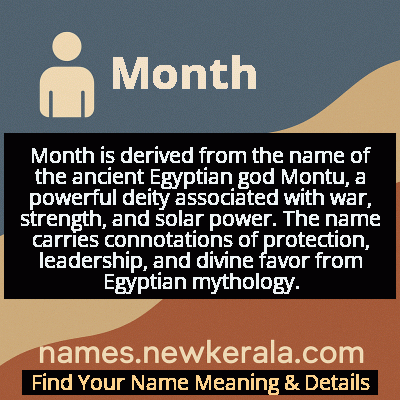Month Name Meaning & Details
Origin, Popularity, Numerology Analysis & Name Meaning of Month
Discover the origin, meaning, and cultural significance of the name MONTH. Delve into its historical roots and explore the lasting impact it has had on communities and traditions.
Name
Month
Gender
Male
Origin
Egyptian
Lucky Number
7
Meaning of the Name - Month
Month is derived from the name of the ancient Egyptian god Montu, a powerful deity associated with war, strength, and solar power. The name carries connotations of protection, leadership, and divine favor from Egyptian mythology.
Month - Complete Numerology Analysis
Your Numerology Number
Based on Pythagorean Numerology System
Ruling Planet
Neptune (Ketu)
Positive Nature
Intuitive, analytical, spiritual, and inquisitive.
Negative Traits
Secretive, reserved, aloof, and can be overly critical.
Lucky Colours
Green, yellow.
Lucky Days
Monday.
Lucky Stones
Cat’s eye, moonstone.
Harmony Numbers
1, 5, 6.
Best Suited Professions
Scientists, researchers, spiritual leaders, detectives.
What People Like About You
Depth of knowledge, analytical skills, spirituality.
Famous People Named Month
Monthu
Ancient Egyptian deity
Principal war god of Thebes, later associated with solar and royal power
Monthu-em-hat
Ancient Egyptian high priest
Fourth Prophet of Amun and mayor of Thebes during turbulent political period
Monthu-hotep
Ancient Egyptian official
Royal steward and administrator under pharaohs of the 12th Dynasty
Name Variations & International Equivalents
Click on blue names to explore their detailed meanings. Gray names with will be available soon.
Cultural & Historical Significance
As Egyptian theology evolved, Montu's role shifted, and he was eventually superseded by Amun as the principal god of Thebes, though he maintained significance as a warrior deity and was sometimes syncretized with other gods like Ra and Horus. His temples at Medamud, Armant, Tod, and Karnak remained important religious centers throughout Egyptian history. The name Month represents not just a deity but the entire cultural and political significance of Thebes as a center of power in ancient Egypt, embodying the martial spirit and royal authority that characterized the region's dominance during various periods of Egyptian history.
Extended Personality Analysis
Individuals named Month are often perceived as possessing strong, assertive personalities with natural leadership qualities. They tend to be determined and focused, capable of great concentration on their goals, much like the warrior god Montu who represented strength and victory in battle. There's often an air of authority about them, and they may excel in competitive environments where their strategic thinking and resilience can shine. Their strong will is typically balanced by a sense of responsibility and loyalty to those they care about.
At the same time, those named Month often have a protective nature toward their loved ones and communities, reflecting the deity's role as a defender. They may balance this strength with a more contemplative side, showing wisdom in decision-making and a respect for tradition and cycles, echoing the god's later associations with cosmic order and temporal cycles. This combination of martial strength and thoughtful wisdom makes them natural leaders who can both inspire and protect their followers. Their personality often reflects the duality of their namesake—both fierce warrior and respected deity, capable of both decisive action and thoughtful consideration.
Modern Usage & Popularity
The name Month remains quite rare in modern times, primarily used by parents with a strong interest in Egyptian mythology or those seeking a unique, culturally significant name. It appears occasionally in academic circles, among Egyptology enthusiasts, and in communities that value ancient cultural heritage. The name has never reached mainstream popularity charts in Western countries, maintaining its status as an unusual and distinctive choice. In recent years, there has been a slight increase in its usage as part of the broader trend toward mythological and historical names, though it remains far less common than other Egyptian deity names like Osiris or Isis. Its usage is most prevalent in artistic and intellectual circles where ancient cultures are appreciated.
Symbolic & Spiritual Meanings
The name Month carries rich symbolic meanings derived from its mythological origins. It represents strength, protection, and martial prowess, reflecting Montu's role as a warrior god. The name also symbolizes cyclical time and celestial order, connecting to concepts of measurement, regularity, and cosmic balance. As a theophoric name (containing a god's name), it implies divine protection and favor, suggesting someone destined for leadership or great achievements. The association with Thebes, one of ancient Egypt's most powerful cities, adds connotations of cultural sophistication, political power, and historical significance. The name embodies the intersection of military strength and spiritual authority that characterized ancient Egyptian kingship, making it a powerful symbolic choice representing both temporal power and eternal values.

